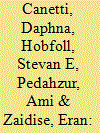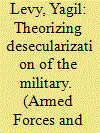|
|
|
Sort Order |
|
|
|
Items / Page
|
|
|
|
|
|
|
| Srl | Item |
| 1 |
ID:
090422


|
|
|
|
|
| Publication |
2009.
|
| Summary/Abstract |
The article discusses the problems of the successes and the failures of Georgia's post-revolutionary economic development. Amongst the positive results, the significant increase of national budget revenues and the overcoming of the energy crises should be emphasized, both of which were achieved by the fight against domestic internal corruption. At the same time, mistakes in terms of both the building of a democratic state and economic policy were made. Making the judiciary an appendage to the General Prosecutor's Office and the executive branch, the government's control of the media and its defiance of property rights, including extra-judicial decisions to demolish privately owned residential houses, are among the most serious errors of Georgia's post-revolutionary development. Despite its anti-Russian rhetoric, the new government has openly welcomed Russian investments into Georgia's economy. After the Russian aggression and under the impact of the global financial crisis, Georgia finds itself in a more complicated situation. International financial aid of US$4.55 billion, which was pledged at the international donors' conference held in Brussels in October 2008 for the reconstruction of post-war Georgia, may enable the country to avoid the banking and currency crisis.
|
|
|
|
|
|
|
|
|
|
|
|
|
|
|
|
| 2 |
ID:
100393


|
|
|
|
|
| Publication |
2010.
|
| Summary/Abstract |
The association between religion and violence has raised much interest in both academic and public circles. Yet on the individual level, existing empirical accounts are both sparse and conflicting. Based on previous research which found that religion plays a role in the support of political violence only through the mediation of objective and perceived deprivations, the authors test Conservation of Resource (COR) theory as an individual level explanation for the association of religion, socio-economic deprivations, and support for political violence. COR theory predicts that when individuals' personal, social or economic resources are threatened, a response mechanism may include violence. Utilizing two distinct datasets, and relying on structural equation models analysis, the latter two stages of a three-stage study are reported here. In a follow-up to their previous article, the authors refine the use of socio-economic variables in examining the effects of deprivation as mediating between religion and political violence. Then, they analyze an independent sample of 545 Muslims and Jews, collected during August and September 2004, to test a psychological-based explanation based on COR theory. This study replaces measures of deprivation used in the previous stages with measures of economic and psychological resource loss. Findings show that the relationship between religion and support of political violence only holds true when mediated by deprivations and psychological resource loss. They also suggest that the typical tendency to focus on economic resource loss is over-simplistic as psychological, not economic, resources seem to mediate between religion and support of violence.
|
|
|
|
|
|
|
|
|
|
|
|
|
|
|
|
| 3 |
ID:
173754


|
|
|
|
|
| Summary/Abstract |
This article addresses scholarly deficiencies in identifying the conditions under which the desecularization of militaries takes place. To theorize this process, two militaries are studied, the United States and Israel. Arguably, six drivers sequentially generate the desecularization of the militaries: (1) Militaries largely mirror the growing influence of religion in the broader society. However, intramilitary drivers play their role in promoting/mitigating the extra-military mechanisms of desecularization. Thus, (2) organizational interests along with external constraints drive militaries to promote religious diversity, which may (3) lead to the empowerment of religious actors, and thereby to further desecularization through religious intolerance, and to (4) reliance on the spiritual and religious services provided by military chaplains, and jointly stimulate (5) the use of religion to motivate military sacrifice. By religiously increasing the symbolic value of military sacrifice, (6) religiosity becomes more naturally associated with good soldiering, thereby reshaping intramilitary hierarchies and, hence, further triggering desecularization.
|
|
|
|
|
|
|
|
|
|
|
|
|
|
|
|
|
|
|
|
|